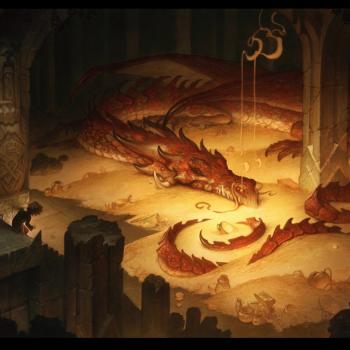
Within Protestantism anyway, when it comes to aspirants to the ministry, I hope it is not too harsh to say, different theological traditions seem to attract different types.
If they weren’t preachers, guys in one tradition I know of could be small-town politicians, in another, smarmy used-car salesmen. (Sorry about the smarmy thing, but you guys just come across that way.)
Before I matriculated into the Reformed tradition, I was part of a bunch of guys that worked hard at becoming that back-slapping uncle you yuk-it-up with at family gatherings. They were into group hugs.
Today I’m surrounded by men who could be accountants.
Just the facts, Ma’am.
The Reformed want to getting it right, and I like that. We’re good at summarizing doctrine, parsing our verbs, and when we’re really cooking, we even make lists to apply the Bible to our lives.
Sometimes, when we’re feeling surly, we exhort, which means we harangue. The Law is sweet on our tongues those days. We goad, we prod.
But do we inspire? I’m not talking about that saccharine stuff we use sometimes, the story of the Down Syndrome boy who was teased at recess, but when Valentine’s Day came along had a card for everyone in the class, bullies included, that sort of thing. I’m talking about the turn of phrase that opens heaven for people.
Artful preaching?
I recall reading a quotation from an old-time preacher that went something like this, “A novel is nothing but a well told lie.”
We don’t own our philistinism like that anymore. Instead we indulge in guilty pleasures. I was just talking about this the other day with a friend. I mentioned that I knew an old preacher from a back-slapper denomination who loved the Three Stooges. And he told me of a man in our denomination of certified public accountants who watches Star Trek when no one is looking.
I’m not saying that watching the Three Stooges or Star Trek will make you a better preacher, well, maybe the Three Stooges will. But learning the art of story definitely can help.
There’s two sides to this, and they’re related. First, you must be able to tell a good story if you hope to inspire, and once you’ve learned that, you’ll find that you’re a better interpreter of other people’s stories.
When I say story, I’m not just referring to anecdotes; I mean stories you have to think about, preferably something written down, with a protagonist and a plot, written in the third person. Short stories are a start, but a really long, complicated story is better: a novel would do it.
I’ve written a couple of those, a few short stories as well, and I can say from experience, not only am I better story teller than I once was, I’m a better interpreter of the Bible.
Choosing your facts carefully
I have a relative who couldn’t tell a story to save her life. She’s convinced that she can, unfortunately. But she gets lost in the detail, everything seems equally important to her. She interrupts herself every other sentence to make sure she has a name right, or the time of day, or what have you, and we all sit around politely thinking to ourselves, “Who cares? Get on with it!”
Facts can be like that. A well placed one, and you can balance the world on a noun. An avalanche of them and you are crushed by meaningless material. Facts must be ordered into hierarchies. If I were to tell you the number of clouds in the sky, or my blood pressure, or how my wallet keeps reminding me that I’m sitting on it, you might say, “Why are you telling me these things?” If I said in response, “I’m just giving you the facts about my day”, you might respond, “What’s the point of that?” To whit I could reply, like any good accountant, “I just report the facts, I don’t choose them.”
But when you tell a story you’ve got to choose; some things are more important than others. The way you know that is by seeing the point.
You see the point by getting inside a story. That’s something you probably do pretty well when you’re in the story (unlike my relative).
When you tell a story people enter into it vicariously. In a sense they live it with you in a virtual reality you create through the telling. I suppose you could say this is a kind of art, this virtual reality you make, art being making, as in artificial, or artifact, or artesian, or artful.
The Bible is the story of the world
I know that people say that the Bible is the story of God, or the story of salvation, and I don’t disagree with them. But many folk don’t know what that has to do with them. What God wants to do is his business, so long as he stays out of our business. But when you say that the Bible is the story of the world they are already in the story whether they want to be or not.
Here is how attempting to tell a really big story, like a novel, can help with this. The world’s story is immense, but it does have a protagonist–Jesus Christ the one through whom the world was made, and the heir of all things. It’s his story. Nevertheless there are billions of subplots, all weaving here and there within that larger plot. These are the stories of our lives, among other things. And these stories find their meaning within the larger story of the world.
If you can weave these little stories into the big one, you won’t need to make the Bible relevant. Instead you can ask your hearers where they fit into the story. (We’re all relevant in this story. When we glorify God we’re on the side of the protagonist. When we pursue vainglory, we’re the enemies he overcomes. We’re either wheat or weeds; and even wheat is awfully weedy. That’s why he must overcome even his friends.)
Allegory or analogy
The problem with allegories is they’re wooden, unadaptable things, with a one to one correspondence. I like The Pilgrim’s Progress just fine, but its already been done. No need for another.
Analogies though, those are highly adaptable, even protean. They can be held up to the eye, like a kaleidoscope, turned this way and that, and then there is that piercing light, filling the eye of the soul.
Now I know what you’re thinking. Christ’s story is not an analogy. And you’re right. We are the analogs, not him. He’s real.
When we preach his story we are invited into it, to participate in it so deeply that his death really becomes ours, and his life really becomes ours, and his reward really becomes ours. Now if you can pull that off, if you can get people to really see themselves in Christ, you’re a real artist.
There’s an old hymn, I Love to Tell the Story. It think it gets it right. A good preacher is not an accountant, he’s a bard, a Homer singing the praises of Achilles. But Homer’s son of a god was no savior. Our Son is; we sing his praises and bring our hearers into his story, not virtually, but really and truly. And if we do it right, “inspiration” goes from being an analogy to something real, it really happens.












